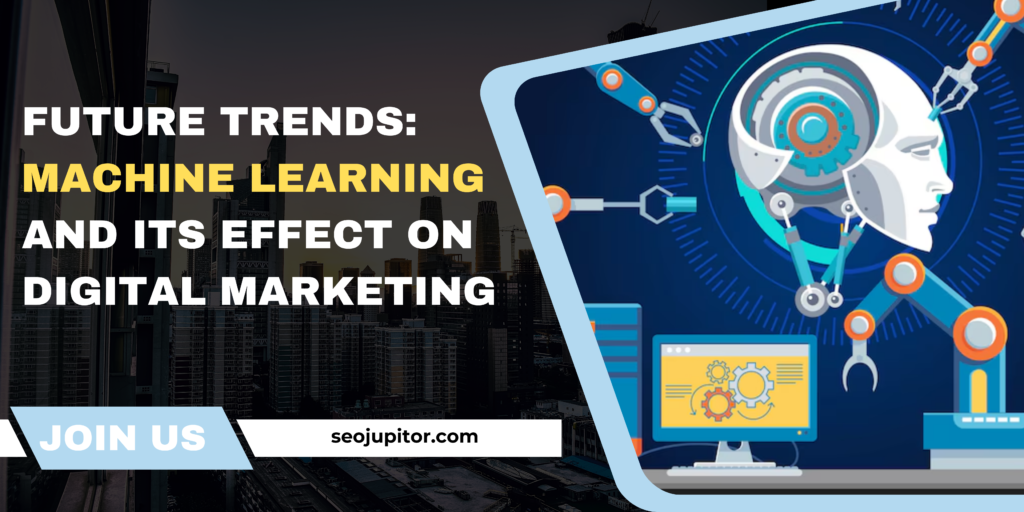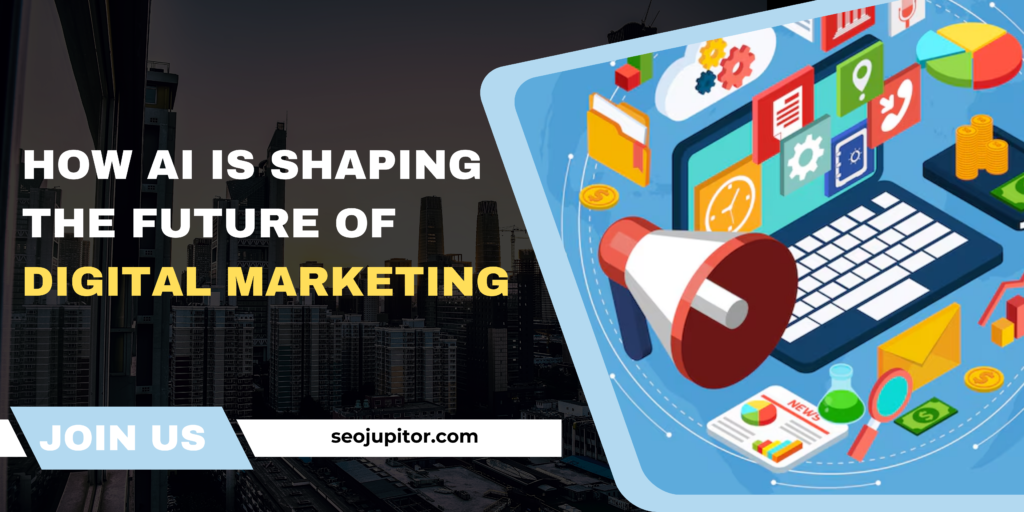In today’s digital-first world, machine learning (ML) is transforming how businesses approach marketing. The ability to process large volumes of data and derive actionable insights has made machine learning an essential tool for crafting effective digital marketing strategies. As this technology continues to evolve, it’s redefining customer interactions, personalizing experiences, and driving unprecedented marketing efficiency. Let’s explore the future trends of machine learning and its profound impact on digital marketing.
- Hyper-Personalized Marketing
Machine learning enables hyper-personalization by analyzing customer data and predicting their preferences. Traditional segmentation based on demographics is being replaced by dynamic audience profiling.
- Behavioral Predictions: ML algorithms can track user behavior, such as browsing history, click patterns, and purchase trends, to create tailored recommendations.
- Dynamic Content Creation: Tools powered by ML can craft personalized emails, website content, or even advertisements that resonate with specific audiences.
For example, Netflix and Amazon rely heavily on machine learning to recommend content or products, keeping users engaged and driving sales.
- Enhanced Customer Experience with Chatbots
Chatbots powered by ML are becoming smarter and more human-like. They help businesses offer round-the-clock support and improve customer satisfaction.
- Natural Language Processing (NLP): Advances in NLP allow chatbots to understand context, tone, and intent, ensuring seamless communication.
- Predictive Assistance: By analyzing past interactions, chatbots can anticipate customer needs and provide proactive solutions.
This technology is crucial for businesses looking to maintain a competitive edge in the era of instant gratification.
Read the blog – How AI Improves Email Marketing A/B Testing for Higher Conversions
- Programmatic Advertising Revolution
Programmatic advertising uses machine learning to automate the buying and placement of ads in real-time. This trend is set to dominate the digital marketing space due to its precision and efficiency.
- Real-Time Bidding: ML algorithms analyze user data to determine the best time and place to display an ad, ensuring higher ROI.
- Fraud Detection: Advanced machine learning models can identify fraudulent clicks and impressions, saving advertisers significant costs.
By eliminating manual intervention, programmatic advertising ensures optimal ad spend and better targeting.
- Predictive Analytics for Better Decision-Making
Predictive analytics, powered by ML, is reshaping how marketers plan their campaigns. It enables businesses to forecast trends, customer behaviors, and campaign outcomes.
- Sales Forecasting: Marketers can predict which products will sell better during specific seasons or events.
- Campaign Optimization: By analyzing past campaign performance, ML provides recommendations on budget allocation and content strategies.
This foresight is invaluable for businesses aiming to stay ahead in competitive markets.
- Voice Search Optimization
As smart speakers and voice assistants become ubiquitous, voice search is reshaping SEO strategies. Machine learning plays a pivotal role in understanding and optimizing for voice queries.
- Conversational Search: ML helps marketers understand the natural language used in voice searches and align their content accordingly.
- Featured Snippets: Businesses can use ML insights to identify opportunities to rank in voice search-friendly featured snippets.
Marketers must focus on creating concise and conversational content to stay relevant in the voice-first era.
- Improved ROI with AI-Powered Analytics
Machine learning simplifies the complex task of analyzing marketing data, providing actionable insights to improve ROI.
- Attribution Modeling: ML determines which touchpoints contribute most to conversions, enabling better resource allocation.
- Churn Prediction: By analyzing customer interactions, ML can identify at-risk customers and suggest strategies to retain them.
With these insights, businesses can refine their strategies and maximize returns on marketing investments.
- Visual and Video Content Optimization
Machine learning is revolutionizing how visual and video content is created and distributed.
- Image Recognition: Platforms like Pinterest use ML to suggest visually similar products, enhancing shopping experiences.
- Video Recommendations: YouTube’s ML algorithms predict what users are likely to watch next, keeping them engaged for longer.
Additionally, ML tools can analyze user interactions with visual content to determine what works best for specific audiences.
- Augmented Reality (AR) Marketing
Augmented reality, combined with machine learning, is set to redefine customer engagement in the digital space.
- Interactive Experiences: AR ads powered by ML can create immersive experiences tailored to individual preferences.
- Product Visualization: From trying on clothes virtually to seeing how furniture fits in a room, AR enhances the decision-making process.
As this technology becomes more accessible, marketers will find innovative ways to integrate it into their strategies.
- Dynamic Pricing Strategies
Dynamic pricing, driven by ML, allows businesses to adjust prices based on real-time demand and competitor analysis.
- Market Trends: ML can track market fluctuations and recommend optimal pricing strategies.
- Customer Segmentation: By analyzing purchasing behavior, businesses can offer personalized discounts or loyalty rewards.
This approach ensures competitiveness and profitability in volatile markets.
- Ethical Considerations and Data Privacy
While machine learning offers numerous advantages, it also raises concerns about data privacy and ethics.
- Transparency: Businesses must ensure that their data collection practices are transparent and comply with regulations like GDPR.
- Bias Reduction: Marketers need to address potential biases in ML algorithms to ensure fair outcomes.
Focusing on ethical use of ML will be critical to building consumer trust in the future.
Final Thoughts
Machine learning is undeniably a game-changer for digital marketing. It offers businesses the ability to engage customers more effectively, optimize campaigns, and improve ROI. However, staying ahead of the curve requires marketers to continually adapt to emerging trends and invest in cutting-edge technologies.
As machine learning continues to evolve, its impact on digital marketing will only grow stronger. Businesses that embrace this technology now will be well-positioned to lead in the future.





Looking for business contact details? Let me do the hard work for you! Get all the info you need for just $30 https://telegra.ph/Personalized-Contact-Data-Extraction-from-Google-Maps-10-03 (or telegram: @chamerion)
Доступные серверы HP Proliant, Сравните цены на сервер HP Proliant
стоимость серверного оборудования https://www.servera-hp-proliant.ru/ .
Подбор сервера HP: все, что вам нужно знать
купить серверы hp http://www.kupit-server-hp.ru/ .
Need more clients for your business? Order targeted contact data from local establishments and watch your outreach soar. https://telegra.ph/Personalized-Contact-Data-Extraction-from-Google-Maps-10-03 (or telegram: @chamerion)
먹튀 피해 걱정 없는 즐거움, 먹튀투데이가 보장합니다.
먹튀 없는 세상을 위한 파트너, 먹튀투데이가 함께합니다.
먹튀 걱정 없는 안전한 하루, 먹튀투데이에서 시작하세요.
국대티비로 좋아하는 스포츠중계를 놓치지 마세요!
Is your business ready to grow? I’ll help you collect contacts from local companies to fuel your success. https://telegra.ph/Personalized-Contact-Data-Extraction-from-Google-Maps-10-03 (or telegram: @chamerion)